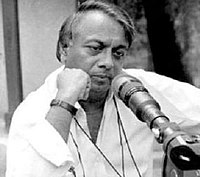Ashok Kumar (cinematographer)
| Ashok Kumar | |
|---|---|
 |
|
| Born |
Ashok Kumar Aggarwal Allahabad, Uttar Pradesh, India |
| Died | 22 October 2014 (aged 73) Chennai, Tamil Nadu, India |
| Occupation | Cinematographer, film director |
| Years active | 1969–2006 |
| Children | 4 sons |
| Awards | |
Ashok Kumar Agarwal (died 22 October 2014) was an Indian cinematographer and director who worked mainly in the South Indian film industry. In a career that spanned over four decades, he worked in over 125 feature films in Malayalam, Tamil, Telugu and Hindi languages. Apart from numerous state government awards, he was also a recipient of the National Film Award for Best Cinematography. Kumar also directed six feature films. He was married and had four sons. One of his sons is a cinematographer as well.
Ashok Kumar was Born in Allahabad, North-Western Provinces, British India to Kedarnath Agarwal, a Hindi poet. He was passionate about cinema right from his childhood despite his family not being connected to films. His reluctant family was initially not supportive of his decision to pursue a career in film but eventually agreed imposing that he should go only to Madras rather than Bombay. After obtaining a diploma in photography from the Allahabad University, he went to Madras and joined the Institute of Film Technology, Adyar, to do a course in motion photography. At the institute, he watched films from World cinema including that of Satyajit Ray's. After graduating from the institute, he made his debut as a cinematographer in the 1969 Malayalam film Janmabhoomi. The film was made by a group of friends who studied with him at the institute. John Sankaramangalam, his teacher at the institute was its director. Ashok Kumar had financially supported the film in its pre-production work and distribution. The film dealt with the theme of religious co-existence and won the Nargis Dutt Award for Best Feature Film on National Integration at the 16th National Film Awards. Ashok Kumar also became the first recipient of the Kerala State Film Award for Best Cinematography for the film. Following that, he received offers to work in numerous Malayalam films for directors such as P. N. Menon, Ramu Kariat and Bharathan. His involvement with the Malayalam film industry in the 1970s, earned him two more Kerala state government awards—for Swapnam (1973) and Taxi Driver (1977).
...
Wikipedia
